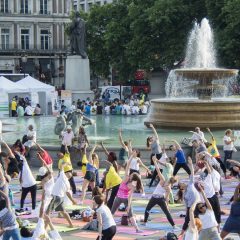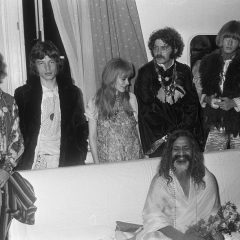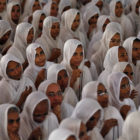The Conversation

The Riz Test: How Muslims are misrepresented in film and TV
By Zahra Khosroshahi — January 28, 2019
(The Conversation) — In their own words, the Riz Test: “is a project to measure the portrayal of Muslims in film and TV."

Yom Kippur: A time for feasting as well as fasting
By The Conversation — September 18, 2018
(The Conversation) — The Jewish practice of abstaining from food on Yom Kippur is out of step with the rest of Jewish tradition, which in its religious and cultural guises has always revolved around food.

How Roe v. Wade changed the lives of American women
By Constance Shehan — July 5, 2018
(RNS) — Justice Anthony Kennedy’s retirement has ignited widespread speculation about the future of Roe v. Wade. Roughly two generations after the landmark decision on abortion, how would overturning Roe change women's lives?

Yoga isn’t timeless: it’s changing to meet contemporary needs
By The Conversation — June 20, 2018
(The Conversation) — Today, part of yoga’s appeal is that it continues to be seen as a mystical, ancient tradition. However, the practice of yoga has gone through some profound shifts.

What are halal foods?
By The Conversation — May 20, 2018
(The Conversation) — When Muslims break their fast during Ramadan, many will only choose foods that are considered permissible under Islamic law. The Arabic word for such food is “halal.”

Why deporting the ‘Dreamers’ is immoral
By The Conversation — March 6, 2018
(The Conversation) — Protecting the Dreamers isn’t about rejecting the rule of law. Rather, it reflects respect for the morality that the law proclaims.

What the joyous solitude of early hermits can teach us about being alone
By The Conversation — February 8, 2018
(The Conversation) — Loneliness (feeling alone) and solitude (being alone) are not the same thing. And lessons can be learned from those who have found solitude essential for inspiration.

How Americans came to embrace meditation, and with it, Hinduism
By Vasudha Narayanan — February 6, 2018
(The Conversation) — In the 1960s many Americans may have only known Hinduism through meditation, but the story of this country’s relationship with Hinduism is much longer and more complex.

The complex history of ‘In God We Trust’
By David Mislin — February 5, 2018
(The Conversation) — From my perspective as a religious history scholar (that phrase) reflect(s) a particular view of the United States, not a universally accepted “American way.”

The changing nature of America’s irreligious explained
By Richard Flory — January 24, 2017
Who really are the nones?

Why understanding Native American religion is key to resolving Dakota Access Pipeline crisis
By RNS staff — November 3, 2016
The Lakota view the area near the potential construction of the Dakota Access Pipeline as both a “sacred place” and a “burial site,” or as both a place set aside from human presence and a place of human reverence.

Aid to dying: What Jainism – one of India’s oldest religions – teaches us
By The Conversation — June 12, 2016
On June 9, a law allowing patients with terminal illnesses to end their lives with help from a physician came into effect in California, opening conversations about whether human life should be prolonged against the desire to die peacefully and with dignity. RELATED STORY: California’s End of Life Option law: More peaceful deaths or moral quicksand? […]

Why St. Thomas Becket’s elbow still matters in the 21st century
By RNS staff — May 29, 2016
One might wonder why anyone today should care about an 850-year-old bone.
Page 1 of 1
